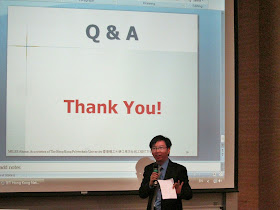In the beginning, Dr. Augus Cheung (Chairman, Branch Committee, The Institution of Engineering and Technology (IET) Hong Kong) gave a welcoming speech. He expressed that Technology is very important in Hong Kong and Bio-engineering is the one of future opportunities.
Souvenir presentation and group photos with speakers and supporting organizations.
Prof. Mok briefed the overview of medical device industry, its opportunities, situation in China and the future trends of the industry. He said ageing population increased and more needs for healthcare globally. The different risk levels of medical device with samples were mentioned.
Then Prof. Mok described the Medical Device Design and Development Cycle. He pointed our the Design for Excellence through IQ, OQ, PQ, etc. Its requirement was much higher than traditional manufacturing product (such as toys).
He also explained the why medical device technology and market was in Blue Ocean but not in Red Ocean. It was because its market demand is more than supply with Four High included technology, entry barrier, margin and risk. After that Prof. Mok introduced the production of medical device in China. Pearl River Delta was mainly for modern medical equipment development which was a combination of high technology achievements in these areas. Future of Pearl River R&D would focus in medical high-tech electronic products, more R&D centers and clincial study with Hong Kong doctors.
Finally, Prof. Mok said the start-up Medical Device industry should have Technical partner and Marketing partner before seeking for investor (e.g. Angel or VC). He also recommended Hong Kong Government should fund Science Park to setup:
a) animal laboratory
b) a small scale factory complying GMP standard to provide pilot-run service (molding, SMT, casing assembly, final test & calibration, packaging, sterilization)
c) a Phase I clinical trial centre for 20-80 patients (whereas Phase II for 100-300 patients) It is because China SFDA made GMP mandatory for medical devices before clinical trials since 2011.
The second speaker was Mr. Bryan MK So (Senior Consultant, Automation Service, Hong Kong Productivity Council) and his presentation was "Recent Development of Regulations & Harmonized Standards for Medical Devices".
The Mr. So introduced Regional organization named Asian Harmonization Working Party (AHWP) which established in 1995. AHWP had 23 member economies by 2012. Finally, he briefed the regulatory updates in Hong Kong that government conducting Business Impact Assessment on the proposed statutory regulation of medical devices from 2011 to present.
Ir. SL Mak (MIES - IET representative) introduced IET membership and its professional qualification.
The last speaker was Prof. Raymond KY Tong (Professor, Interdisciplinary Division of Biomedical Engineering) and this topic entitled "Robotics for Stroke Rehabilitation: An Intention Driven System using EMG".
Prof. Tong briefed the background that active initiation and participation in the rehabilitation is a key of success. The Hand Robot would motivate patients (stroke or brain injury) to actively interact with the system during the task-related training regime.
Some videos were showed how good the training using the Hand Robot.
The sample hand robot was circulated and I took a photo for memory.
At the end, Mr. Samson Lam (Chairman, MIE Section, IET Hong Kong) gave a closing remark.
Reference:
IET (HK) - www.theiet.org/hongkong
















沒有留言:
發佈留言